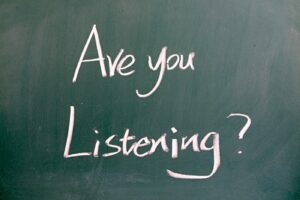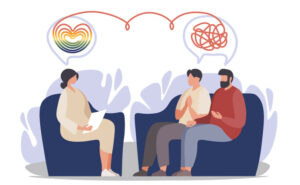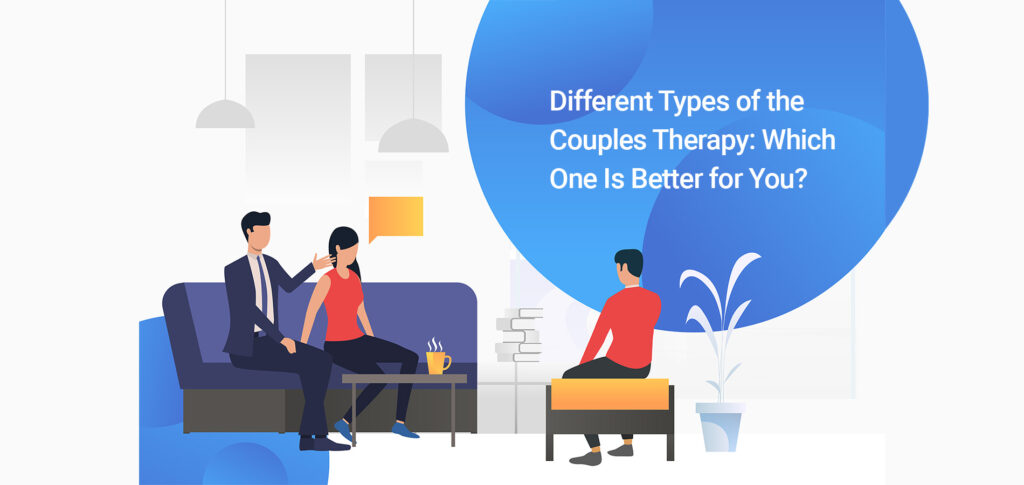Couples therapy is a process where couples meet with a therapist to help resolve conflicts and improve communication. It can be a very beneficial way to strengthen your relationship, but it’s important to choose the right type of therapy for your needs. In this blog post, we will discuss 10 types of couples therapy and what each one entails. We’ll also give you some tips on how to choose the right type of therapy for your relationship.
Contents
Defining Couples Therapy
 Couples therapy is a new and very popular form of therapy. It is a process in which two people meet with a therapist to help resolve conflicts and improve communication. Couples therapy can be very beneficial for relationships, but it is important that the right type of therapy is chosen in order for it to work well.
Couples therapy is a new and very popular form of therapy. It is a process in which two people meet with a therapist to help resolve conflicts and improve communication. Couples therapy can be very beneficial for relationships, but it is important that the right type of therapy is chosen in order for it to work well.
The benefits of couples therapy are many. It can help improve communication, resolve conflict, and increase intimacy. It can also help to reduce stress, anxiety, and depression. Couples therapy can be a very beneficial way to strengthen your relationship, but it’s important to choose the right type of therapy for your needs.
It is important to note that couples therapy is not just for couples who are having problems. It can also be very beneficial for couples who are doing well but want to improve their relationship.
10 Types Of Couples Therapy
Even in couples therapy, there are various types of therapy. Here are ten popular types of couples therapy. Each type has its own benefits and drawbacks, so it’s important to choose the right one for your relationship. Despite the differences, they all have one ultimate goal: to improve the quality of your relationship.
Couples counseling
The very first choice is couples counseling. In basic words, counseling refers to meeting with a professional to talk about the relationship. It is recommended for almost all types of couples, whether they are having serious problems or just want to improve their communication.
In this type of therapy, the therapist will help you and your partner communicate better. You will learn how to express yourself more effectively, as well as how to listen to your partner. This type of therapy can be very beneficial for relationships, as it can help improve communication and resolve conflict.
The main advantage of this therapy is that it gives the space to work on individual issues in addition to couple’s issues. It can also be a very effective way to improve communication.
Reflective listening
 This is more of a technique than a type of therapy, but it can be very helpful for couples. Reflective listening is a way of listening to your partner in which you repeat back what they said, in your own words.
This is more of a technique than a type of therapy, but it can be very helpful for couples. Reflective listening is a way of listening to your partner in which you repeat back what they said, in your own words.
The purpose of this technique is to help you understand what your partner is saying, as well as to show them that you are listening. This can be a very effective way to improve communication, as it can help you and your partner understand each other better.
The main advantage of reflective listening is that it is quite simple and easy to do. It can also be very effective in improving communication.
Behavioral Couples Therapy
This is a form of therapy that is based on the principle of positive reinforcement. In this type of therapy, couples are taught to reinforce each other’s positive behavior. This can be a very effective way to improve communication and increase intimacy.
The mechanisms of this type of therapy work by increasing the frequency of positive behaviors. As a result, couples begin to feel closer to each other and communication improves.
The main advantage of behavioral couples therapy is that it is very effective in improving communication and increasing intimacy. It can also be quite affordable, as it does not require a lot of time or money.
Solution-focused therapy
This one might be very obvious based on its name. But solution-focused therapy is all about helping couples find solutions to their relationship problems. This type of therapy can help couples learn how to communicate better, handle conflict constructively, and work together as a team. If you’re the type of couple who likes to problem-solve and be proactive about making your relationship better, solution-focused therapy could be a right fit for you.
This therapy requires both partners to be fully invested and committed to the process. If one partner is reluctant or resistant, it’s likely that this type of therapy won’t be as effective.
It focuses on identifying, understanding, and changing the thoughts and behaviors that are contributing to relationship problems. It then shifts to helping couples build more positive and productive ways of relating to each other.
For example, a therapist might help a couple identify the thoughts and behaviors that are causing conflict. Then, they would work together to find more constructive ways of communicating and behaving.
Emotion-focused couples therapy
This is very self-explanatory; the therapist helps the couple to focus on and understand their emotions. This is done through exploring past patterns, communicating openly, and working towards mutual goals.
The main goal of emotion-focused therapy is to help the couple feel more connected to each other. For couples facing infidelity, this may involve working through trust issues.
The techniques and tools used in emotion-focused therapy can be very helpful for couples who want to improve their communication and emotional connection. For example, learning to understand and express emotions in a healthy way can help couples feel closer to each other .
Narrative therapy
Narrative therapy is an approach to helping the couple to change their story. It focuses on reframing the way they see their relationship, as well as exploring new narratives. It is based on the belief that we all have the power to change our own stories.
In context of couples therapy, the narrative approach can help the couple to externalize their problems. This means that they are able to see their difficulties as separate from themselves. This can help to reduce blame and shame and open up new possibilities for change.
For example, a couple may have been arguing about money for years. Through narrative therapy, they may be able to reframe their story and see their financial difficulties as something that is affecting their relationship, rather than something that is wrong with them as individuals. This can help to reduce the stress and tension in the relationship and open up new possibilities for dealing with their finances, such as budgeting or financial counseling.
Imago relationship therapy

Imago therapy is based on the idea that we are all attracted to our “opposites” because they have qualities we lack. This therapy is designed to help us understand why we are attracted to our partners and how to work through the inevitable conflict that comes from being with someone who is different from us.
For therapeutic reasons, imago therapy is conducted with both partners present. The therapist acts as a facilitator, helping the couple to understand and communicate their feelings. For example, the therapist might help the couple to understand that the wife’s need for order is a reaction to her chaotic childhood.
The therapist will also help the couple to develop new communication and conflict-resolution skills. These skills are based on the idea that we can only change ourselves, not our partners.
This type of therapy can be very effective for couples who are willing to work hard on their relationship. It can help them to understand themselves and each other better and to find new ways to resolve conflict.
Discernment counseling
This is a lesser-known yet very effective type of therapy for couples on the brink of divorce. It’s designed for couples who are sure they want to end their marriage but want to do so amicably. The therapist helps the couple communicate their feelings and figure out the logistics of ending their relationship.
In this therapy, the therapist takes a more active role than in other types of therapy. They help by giving feedback, providing support, and making suggestions. This type of therapy is usually recommended for couples who are in a crisis or have a lot of anger and conflict.
Gottman method
This is a very unconventional yet effective type of therapy. It’s based on the work of Dr. John Gottman, who has studied couples for over 40 years. He has found that there are four main predictors of divorce:
- Contempt
- Criticism
- Defensiveness
- Stonewalling
The Gottman method focuses on helping couples to reduce these negative behaviors. It is based on the idea that all couples have conflict, but some couples are able to manage it in a healthy way.
This type of therapy is usually conducted over the course of several sessions. The therapist will help the couple to understand the four predictors of divorce and how to avoid them. They will also teach the couple new communication and conflict-resolution skills.
Relational life therapy
 Lastly, relational life therapy is a type of therapy that is designed to help couples improve their relationship. It is based on the idea that our relationships are a reflection of our inner lives. This means that if we want to improve our relationships, we need to work on ourselves first.
Lastly, relational life therapy is a type of therapy that is designed to help couples improve their relationship. It is based on the idea that our relationships are a reflection of our inner lives. This means that if we want to improve our relationships, we need to work on ourselves first.
This type of therapy is usually conducted over the course of several sessions. The therapist will help the couple to understand themselves and each other better. They will also teach the couple new communication and conflict-resolution skills.
This type of therapy can be very effective for couples who are willing to work hard on their relationship. It can help them to understand themselves and each other better and to find new ways to resolve conflict.
So, there you have it! These are just some of the many types of couples therapy that are out there. If you and your partner are having trouble in your relationship, don’t hesitate to seek help from a professional. Couples therapy can be a great way to improve your relationship and build a stronger bond with your partner.
Choosing The Right Type Of Therapy For Your Relationship
 Now that we know more about the different types of therapy, how do we choose the right one for our relationship? The answer to this question depends on a few factors.
Now that we know more about the different types of therapy, how do we choose the right one for our relationship? The answer to this question depends on a few factors.
Some things you may want to consider include:
- The severity of the problem: If your relationship is in a crisis, you may want to seek help from a therapist who specializes in crisis counseling.
- Willingness: Since couples therapy requires mutual participation, both you and your partner need to be willing to work on the relationship.
- Budget: Therapy can be expensive, so you may want to consider your budget when choosing a therapist.
- Your goals for therapy: What do you hope to achieve from therapy? Are you hoping to improve communication, resolve conflict, or simply learn more about yourself and your partner?
- Your comfort level: It’s important to feel comfortable with your therapist. If you don’t feel comfortable, it will be difficult to open up and work on your relationship.
The type of therapy that will best fit your needs will likely vary depending on the above factors. If you’re not sure what types of couples therapy is right for you, don’t hesitate to ask a professional for help. Couples therapy can be a great way to improve your relationship. It can help you to understand yourself and your partner better. This can further improve the quality of your relationship.
Conclusion
To conclude, we now know the different types of therapy available for couples. You and your partner can pick which one would benefit you the most. Each type has its own set of techniques to help improve communication and resolve conflict. Couples therapy can be a great way to improve your relationship and build a stronger bond with your partner. If you’re having trouble in your relationship, don’t hesitate to seek help from a professional.
If you or your partner are struggling with any type of relationship issues, Therapy Mantra is here for you. We are the leading providers of online therapy and counseling. Our team of highly trained and experienced therapists can help you work through your issues. Our sessions are open to individuals as well as couples. Contact us today to learn more about our services. You may also visit our website to book an online therapy session or download our free Android or iOS app for more information.


